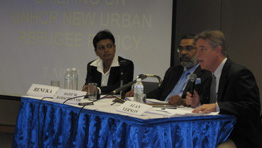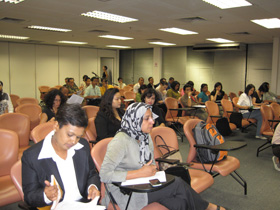| Bar Council-UNHCR Briefing on UNHCR’s New Urban Refugee Policy (7 April 2010) |  |  |  |
| Tuesday, 20 April 2010 03:53pm | |
| Article contributed by Sumitha Shaanthinni Kishna, Executive Officer, and photos by Satha Selvan s/o Subramaniam, Administrative Assistant  The office of the United Nations High Commissioner for Refugees (UNHCR) in Malaysia and the Malaysian Bar Council jointly organised a briefing on UNHCR’s new urban refugee policy on 7 April 2010 at the Bar Council Secretariat. A total of 65 participants attended the briefing including city/local councillors, representatives of local government authorities, student representatives of local universities, members of civil society, members of the media and elected representatives. The briefing was organised by the Subcommittee on Migrants, Refugees and Immigration Affairs, which is chaired by M Ramachelvam. This briefing was unique as it is the first time the Malaysian Bar Council is participating in an initiative involving local government authorities on issues concerning refugees. Thus, the briefing focused on UNHCR’s new urban refugee policy and the opportunities that it offers for the involvement of local authorities in meeting the challenges of managing refugees in Malaysia.  After M Ramachelvam’s welcome address, Alan Vernon, UNHCR representative to Malaysia, spoke extensively on UNHCR’s work in the country. He stated that unlike migrants who have the choice to go home to their country, the refugees are here to stay for an indefinite period of time for fear of persecution from their governments. He stressed that there is thus a need for all stakeholders at the local, state and national levels to take cognisance of the existence of refugees in their jurisdictions and to work together for solutions. He stated that it is important to address the situation of refugees, and to minimise problems and maximise opportunities their presence may create for local populations. After M Ramachelvam’s welcome address, Alan Vernon, UNHCR representative to Malaysia, spoke extensively on UNHCR’s work in the country. He stated that unlike migrants who have the choice to go home to their country, the refugees are here to stay for an indefinite period of time for fear of persecution from their governments. He stressed that there is thus a need for all stakeholders at the local, state and national levels to take cognisance of the existence of refugees in their jurisdictions and to work together for solutions. He stated that it is important to address the situation of refugees, and to minimise problems and maximise opportunities their presence may create for local populations.Alan stated that the population of refugees in the cities is growing in tandem with the general growth of the population in the cities. In response to this trend, the two key principles of the new urban refugee policy are firstly, to ensure that cities are recognised as legitimate places for refugees to reside and exercise the rights which they are entitled to, and secondly, to maximise the protections available to urban refugees and the humanitarian organisations that support them. Renuka T Balasubramaniam, Member of the Bar, gave a comparative view with two city councils in Australia. The Brisbane City Council partners with the corporate sector and the local community to ensure that the city is one where cultural diversity is valued and celebrated, and refugees are able to participate fully in civic life. The City of Charles Sturt Council in Australia has implemented a new arrival and refugee programme, which offers, amongst others, a monthly immunisation clinic for refugees.  The briefing generated much lively discussion and concluded with several recommendations for the way forward, namely that local government authorities should undertake identification and registration of refugees in partnership with UNHCR, refugees should be included in future local government programmes, and there should be more robust participation of universities to educate students on issues relating to refugees. The briefing generated much lively discussion and concluded with several recommendations for the way forward, namely that local government authorities should undertake identification and registration of refugees in partnership with UNHCR, refugees should be included in future local government programmes, and there should be more robust participation of universities to educate students on issues relating to refugees. The participants also agreed to form a task force on refugees to collaborate with the various local government authorities in Malaysia to address the relevant issues. Members of the Bar, members of civil society and those with an interest in such issues are welcome to join the task force. Please contact Sumitha Shaanthinni Kishna at sumitha@malaysianbar.org.my if you would like to contribute to this initiative. |
No comments:
Post a Comment